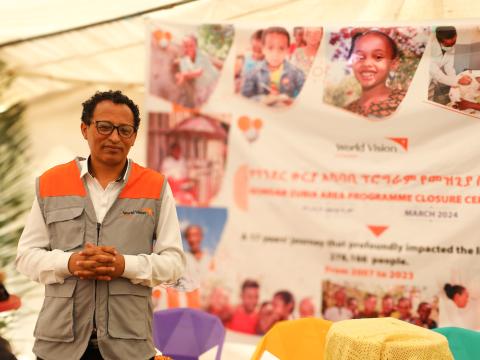Vision Beyond Sight: The Unyielding Spirit of Humanitarians

Tewodros Abate, a 53-year-old humanitarian and father of three, is known for his warmth and dedication to comforting those around him. Currently working for World Vision Ethiopia and residing in Bahir Dar, the capital city of the Amhara region, Tewodros has built his life around a simple yet profound belief: true strength lies in the ability to endure and serve, regardless of the circumstances. This guiding principle has shaped his career, making him a prominent figure in humanitarian efforts throughout the region.
But how does one find the strength to continue, especially when faced with personal and professional hardships? Tewodros’s solid spirit and commitment to helping others, even in the most difficult circumstances, is remarkable.
Before becoming a humanitarian, Tewodros was a teacher, but his passion for helping others was evident even then. Whether at school or through his church, he participated in various volunteer activities, always striving to uplift students and their families. “I have always had a passion for supporting communities in need,” he often says. His actions are deeply rooted in his religious and personal beliefs.
Tewodros joined World Vision 10 years ago, driven by a desire to serve the most vulnerable children. “The organization’s vision aligns with mine,” he said. “So, I didn’t have any difficulty adjusting.” Over the years, he dedicated himself to those most in need, especially children whose lives had been torn apart by poverty and crisis. Starting as a cluster programme manager in Gonder City, he quickly earned a reputation for his unwavering dedication to those in need.
The Amhara region has been grappling with ongoing conflicts, beginning with the Northern Ethiopia conflict (2020-2022) between Tigray forces and the federal government. After the resolution of the Northern Ethiopia conflict, violence persisted between various armed groups and the federal government within the region. The conflict has left deep scars on both the land and its people, with children bearing the brunt of the violence. Schools were destroyed, families torn apart, and the community's sense of safety shattered.
The ongoing conflict made accessing affected areas perilous, with convoys often intercepted and staff facing harassment and even violence. "Humanitarian workers are operating in an extremely fragile context in the region," Tewodros explained. "But the need drives us to work in these unstable conditions to reach the affected community."
Resource limitations added to the burden. "We want to provide more because the need is higher, yet there is a limitation of resources, which breaks my heart," Tewodros said. He recognized that peace and stability were crucial to overcoming these challenges. Despite the hardships, “As a humanitarian, I am proud to serve others, When I think that my work can save or improve lives, it keeps me going," he said.
Tewodros's journey took a challenging turn when he was diagnosed with a progressive eye condition. Despite medical intervention, his eyesight continued to worsen until he lost his vision entirely. 'As a human being, you feel down at that time,' he acknowledged. 'But as a Christian, I knew that God did not finish with his work in my life.' He added, 'I believe that God is in control. I prayed, found comfort, and accepted my situation,' which enabled him to continue his work despite his condition.
For many, losing eyesight would have marked the end of such a demanding career. But for Tewodros, it was another test of his resolve. Guided by his principles and the belief that every child deserves a chance at life, he pressed on. “I might have lost my sight, but not my vision,” he said. Supported by his team and the community, he learned to navigate his new reality. He expressed deep gratitude for the support from his family, friends, and colleagues. He was particularly thankful to World Vision Ethiopia, which continued to believe in him. “The organization promoted me to lead the regional hub, recognizing my commitment and hard work,” he said.
Samuel Tilahun, the Operations Director at World Vision Ethiopia, expressed his deep gratitude for working alongside Tewodros Abate, describing him as an invaluable team member. "He truly embodies the principle of walking the talk. Despite the challenges he faces, I am continually inspired by his unwavering commitment and willingness to go above and beyond for the benefit of children and the community," said Samuel.
In quiet moments, when the weight of his work bore down on him, Tewodros found solace in his Christian faith. He believed his life had a purpose—to be a light in the darkness for those who had none. “To be a humanitarian, you need to act humanely,” he said. “Put yourself in the place of those who are suffering. What if it were my family, my brother, my sister? Humanitarians should work from their hearts.”
Tewodros also emphasized the importance of core humanitarian principles. “Neutrality, impartiality, and community engagement with love and respect are crucial for gaining trust in humanitarian work,” he concluded.
Losing his eyesight did not diminish his ability to serve others. Instead, it sharpened his resolve. Though he could no longer see the faces of the children he helped, he could feel their gratitude in their voices and sense the hope that blossomed from their suffering. He had become an unseen light, a beacon of hope for a region in desperate need of one. As long as he had breath, Tewodros would continue to fight for the children, their future, and a world where they could grow up free from fear.
By Daniel Kefela, Communication Manager (NECR), World Vision Ethiopia